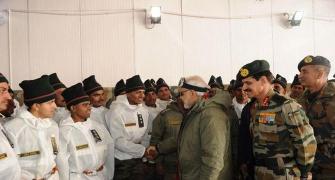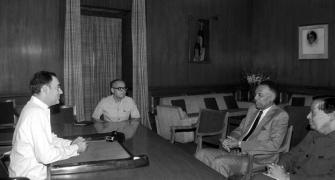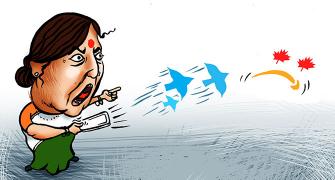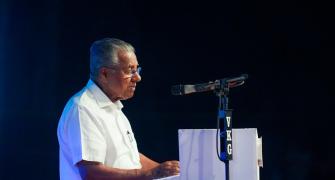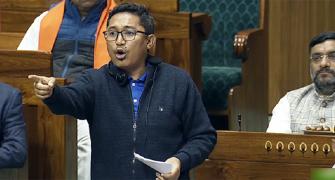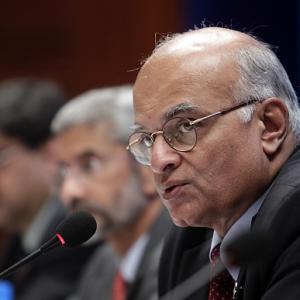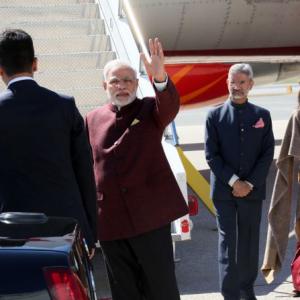'The digital age has forced diplomats to be less formal and more accessible, reaching out to ordinary people both within and outside their countries, combining statecraft with streetcraft,' says former foreign secretary Ambassador Shyam Saran.
Illustration: Dominic Xavier/Rediff.com
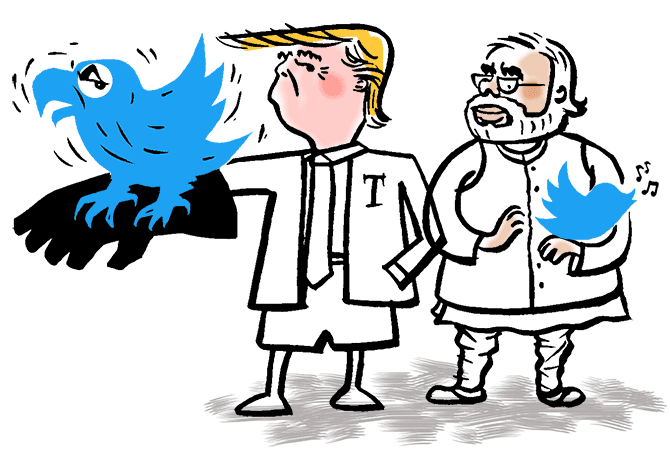
Tom Fletcher, a former British diplomat, has explored the practice of diplomacy in the digital age in his book, Naked Diplomacy.
He has traced the birth of diplomacy to that Stone Age encounter when one of our ancestors succeeded in persuading his neighbour to join hands in hunting or foraging for food, instead of repeatedly clubbing him on the head in order to grab his meagre meal.
Not much has changed since then, or has it?
India may have succeeded in persuading China to put aside the club it was brandishing threateningly in Doklam, to join in collaborating at Xiamen instead.
Diplomacy appears to have delivered for the present.
Through the frenetic change in our lives brought about by rapid technological advancement, the challenge for humanity remains remarkably elemental -- how do we get along as individuals, communities, societies and nations, restraining our ancient urge towards violence and domination?
While diplomacy is usually referred to in the context of relations among States, but sometimes more diplomacy is expended at home than abroad in managing relationships.
As long as humans exist and must learn to live with each other, as individuals or as nations, diplomacy will remain relevant.
So diplomacy is not about to die a digital death though its practice will stand transformed.
Digital technology has spawned what we know as the Information Age.
In the not too distant past, States derived their authority from a monopoly over information, their ability to restrict access to such information and the power to manipulate it.
Today, States can remain relevant only if they become the source of expeditious dissemination of high quality and reliable information.
The premium on secrecy has given way to that on transparency.
Internet and social media has created a virtual deluge of up-to-date information in the public domain and this has empowered the ordinary citizen, the aam aadmi, like never before and the State and its agents, including diplomats, are under unprecedented and pervasive public scrutiny.
Traditional diplomacy has all the hallmarks of an elitist pursuit of an elegant and esoteric craft.
It is those who were schooled in statecraft and steeped in the elaborate trappings, language and formal etiquette of diplomacy who were considered the best guardians of managing inter-state behaviour.
The digital age has disrupted traditional diplomacy, forcing diplomats to be less formal and more accessible, reaching out to ordinary people both within and outside their countries, combining statecraft with streetcraft.
Modern diplomacy requires mastering the art of networking through channels, which run horizontally rather than vertically through hierarchical structures.
This public outreach must nevertheless go hand in hand with the embrace of secrecy when this is required.
In dealing with sensitive situations transparency is often a deal-breaker.
Nevertheless, there is no doubt that transparency and the involvement of the public and the media have become significantly more salient than before and pose a challenge to effective diplomacy.
Diplomacy in the digital age places a premium on the speed of communication.
Social media like Facebook and Twitter enable instant dissemination of information and opinions that form around it.
Diplomats can and should use the same tools to get credible information and assessments into the public domain so that misperception and misinformation are minimised.
The ministry of external affairs was the very first ministry of the Government of India to adopt these social media tools and has been a pioneer in adapting Indian diplomacy to the digital age.
However, this very ability to ensure swift reaction to unfolding events and staying ahead of the information curve may undermine a very integral aspect of diplomacy.
This is the diplomat's responsibility to ensure deliberation and reflection before committing the State to any particular position.
Instant and unmediated reactions can be risky, particularly when inter-State tensions may be high.
On the other hand, delay in reacting to a particular situation may also be risky in a world where typically events unfold with bewildering rapidity. There are no easy answers.
These days leaders are on Twitter and their comments on events spread instantly and widely.
Leaders are often directly in touch with one another and believe, sometimes with good reason, that personal diplomacy may yield more substantive results than diplomats negotiating with one another.
But not all political leaders are masters of statecraft and seasoned communicators. So the risks are great.
In the pre-digital age, diplomats derived their authority from the States they represented.
In the digital age, the authority of the State itself has diminished and the diplomat must now represent his people and not just the government.
By the same token, while he is accredited to the government of the host State, he must interact with the people of the country, its civil society, its media, and its business and industry.
His canvas has become extremely large and multi-tasking is an indispensable and not merely a desirable requirement.
Furthermore, these non-state entities have become much more influential thanks to the digital age. They are able to establish and operate through dense cross-border networks.
For a diplomat this requires becoming a master of networking skills himself.
The notion of sitting behind a desk and managing relations with governments of other States, mainly through formal written communications or stylised diplomatic conversations, is now out of date.
Diplomats must aspire to become critical nodes in networks in which governments are only one and not always the most significant and influential component.
The digital world is complex and constantly mutating.
Diplomacy needs to keep abreast of these changes and constantly upgrade and update the principles and practices of the profession.
In a congested world of competing states and competing networks, there are heightened dangers of inter-state conflict.
Social media may exacerbate inter-State differences.
Recently, Prime Minister Modi and Chinese President Xi Jinping agreed that differences between India and China must not become disputes, but they often do thanks to the amplification provided by the media, especially social media.
Diplomacy operates best in areas of grey. It shrivels when issues are framed in black and white.
One of the challenges to diplomacy in the digital age will be whether enough grey zones still remain for tensions to be moderated and differences to be reconciled.
The shrill voices we hear both at home and abroad need to tune down the decibel level so that we listen to each other rather than shout past each other in mutual incomprehension.
Former foreign secretary Ambassador Shyam Saran is a Senior Fellow, CPR.
His book, How India Sees the World, has just been published.


